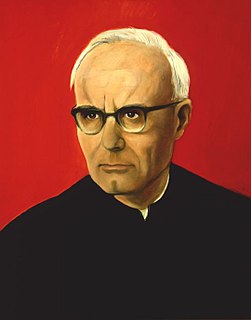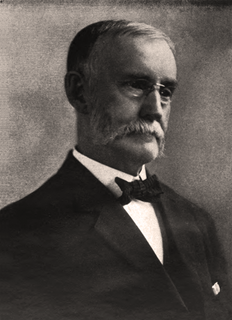A Quote by Karl Rahner
What Christ gives us is quite explicit if his own words are interpreted according to their Aramaic meaning. The expression 'This is my Body' means this is myself.
Related Quotes
As he loves us, he would have us love others. We say men are not worthy of such friendships. True, they are not. Neither are we worthy of Christ's wondrous love for us. But Christ loves us-not according to our worthiness-but according to the riches of his own loving heart! So should it be with our giving of friendship-not as the person deserves-but after the measure of our own character.
Blessed be the God and Father of our Lord Jesus Christ, who has blessed us in Christ with every spiritual blessing in the heavenly places . . . He destined us for adoption as his children through Jesus Christ, according to the good pleasure of his will, to the praise of his glorious grace that he freely bestowed on us in the Beloved.
It is God's earth out of which man is taken. From it he has his body. His body belongs to his essential being. Man's body is not his prison, his shell his exterior, but man himself. Man does not "have" a body; he does not "have" a soul; rather he "is" body and soul. Man in the beginning is really his body. He is one. He is his body, as Christ is completely his body, as the Church is the body of Christ
It is not the man who is responsible for the offerings as they become Christ's Body and Blood; it is Christ Himself who was crucified for us. The standing figure belongs to the priest who speaks these words. The power and the grace belong to God. 'This is My Body,' he says. And these words transform the offerings.
This is the amazing story of God’s grace. God saves us by His grace and transforms us more and more into the likeness of His Son by His grace. In all our trials and afflictions, He sustains and strengthens us by His grace. He calls us by grace to perform our own unique function within the Body of Christ. Then, again by grace, He gives to each of us the spiritual gifts necessary to fulfill our calling. As we serve Him, He makes that service acceptable to Himself by grace, and then rewards us a hundredfold by grace.
We are to believe and follow Christ in all things, including his words about Scripture. And this means that Scripture is to be for us what it was to him: the unique, authoritative, and inerrant Word of God, and not merely a human testimony to Christ, however carefully guided and preserved by God. If the Bible is less than this to us, we are not fully Christ's disciples.
To be "in Christ" is to place one's trust in Him for salvation from sin. To be "in Christ" is to trust His goodness, not our own; to trust that His sacrificial death on the cross paid the complete debt of death we owe for our sin; to trust that His resurrection gives us eternal life instead of relying upon our own ability to please God. To be "in Christ" is to claim, by faith, the free gift of salvation. To be "in Christ" is to enjoy a completely restored relationship with our Father in heaven by virtue of His Son's righteous standing.
And according as we say, "Our Father," because He is The Father of those who understand and believe; so also we call it "our Bread," because Christ is The Bread of those who are in union with His Body. And we ask that this Bread should be given to us daily, that we who are in Christ, and daily receive The Eucharist for the Food of Salvation, may not by the interposition of some heinous sin...be separated from Christ's Body.
So we see, brethren and sisters that the words of Christ can be a personal Liahona for each of us, showing us the way. Let us now be slothful because of the easiness of the way. Let us in faith take the words of Christ into our minds and into our hearts as they are recorded in sacred scripture and as they are uttered by living prophets, seers, and revelators. Let us with faith and diligence feast upon the words of Christ, for the words of Christ will be our spiritual Liahona telling us all things what we should do.
The first step to be taken by one who wishes to follow Christ is, according to Our Lord’s own words, that of renouncing himself - that is, his own senses, his own passions, his own will, his own judgement, and all the movements of nature, making to God a sacrifice of all these things, and of all their acts, which are surely sacrifices very acceptable to the Lord. And we must never grow weary of this; for if anyone having, so to speak, one foot already in Heaven, should abandon this exercise, when the time should come for him to put the other there, he would run much risk of being lost.
To encounter Christ is to touch reality and experience transcendence. He gives us a sense of self-worth or personal significance, because He assures us of God's love for us. He sets us free from guilt because He died for us and from paralyzing fear because He reigns. He gives meaning to marriage and home, work and leisure, personhood and citizenship.
Christ used the flesh and blood of Mary for his life on earth, the Word of love was uttered in her heartbeat. Christ used his own body to utter his love on earth; his perfectly real body, with bone and sinew and blood and tears; Christ uses our bodies to express his love on earth, our humanity. A Christian life is a sacramental life, it is not a life lived only in the mind, only by the soul... Our humanity is the substance of the sacramental life of Christ in us, like the wheat for the host, like the grape for the chalice.
He who asks to receive his daily bread does not automatically receive it in its fullness as it is in itself: he receives it according to his own capacity as recipient. The Bread of Life (cf. Jn. 6:35) gives Himself in His love to all who ask, but not in the same way to all; for He gives Himself more fully to those who have performed great acts of righteousness, and in smaller measure to those who have not achieved so much. He gives Himself to each person according to that person's spiritual ability to receive Him.





































